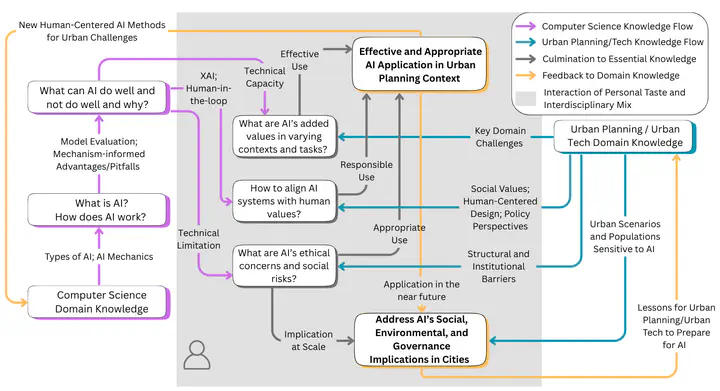Urban AI Pedagogy: Frameworks and Lessons from a Pilot Course in Urban Planning Education
 Knowledge Graph of Urban AI (Credit Xiaofan Liang)
Knowledge Graph of Urban AI (Credit Xiaofan Liang)(In Progress)
Feel free to check out the Urban AI course syllabus and student project portfolio in 2025 at: https://www.xiaofanliang.com/teaching/
Abstract
Artificial Intelligence (AI) has been increasingly integrated in urban planning research and practice. In education, the rise of generative AI (GenAI) tools has significantly shaped student learning. Despite these advancements, few urban planning curricula have incorporated AI content or enabled students to meaningfully leverage GenAI tools in their learning and very few have attempted to design a course explicitly addressing the emerging field of Urban AI. This gap leaves educators facing critical uncertainties: What knowledge and skills define Urban AI? How should they be taught? And how can student learning be effectively evaluated?
This paper addresses these questions by presenting the pedagogical design and assessment of an Urban AI course offered at the Taubman College of Architecture and Urban Planning, University of Michigan, in Winter 2025. It introduces a knowledge graph that characterizes the components and flows of knowledge essential for urban planning and urban technology students in the field of Urban AI, alongside a set of evaluation metrics to assess students’ critical use and thinking with AI tools. These frameworks were refined through feedback from the pilot offering of the course and grounded in hundreds of examples drawn from student reflection journals.
The paper contributes to planning pedagogy in three ways: (1) by proposing an operational teaching framework for faculty seeking to introduce Urban AI into their classrooms; (2) by highlighting key pedagogical tensions and growth observed through empirical evidence; and (3) by offering a starting point for debate, refinement, and co-construction of Urban AI pedagogy.
Keywords: Urban AI, pedagogy, qualitative analysis